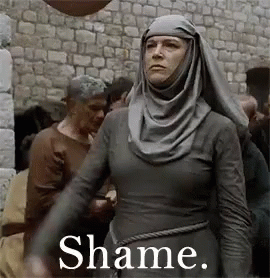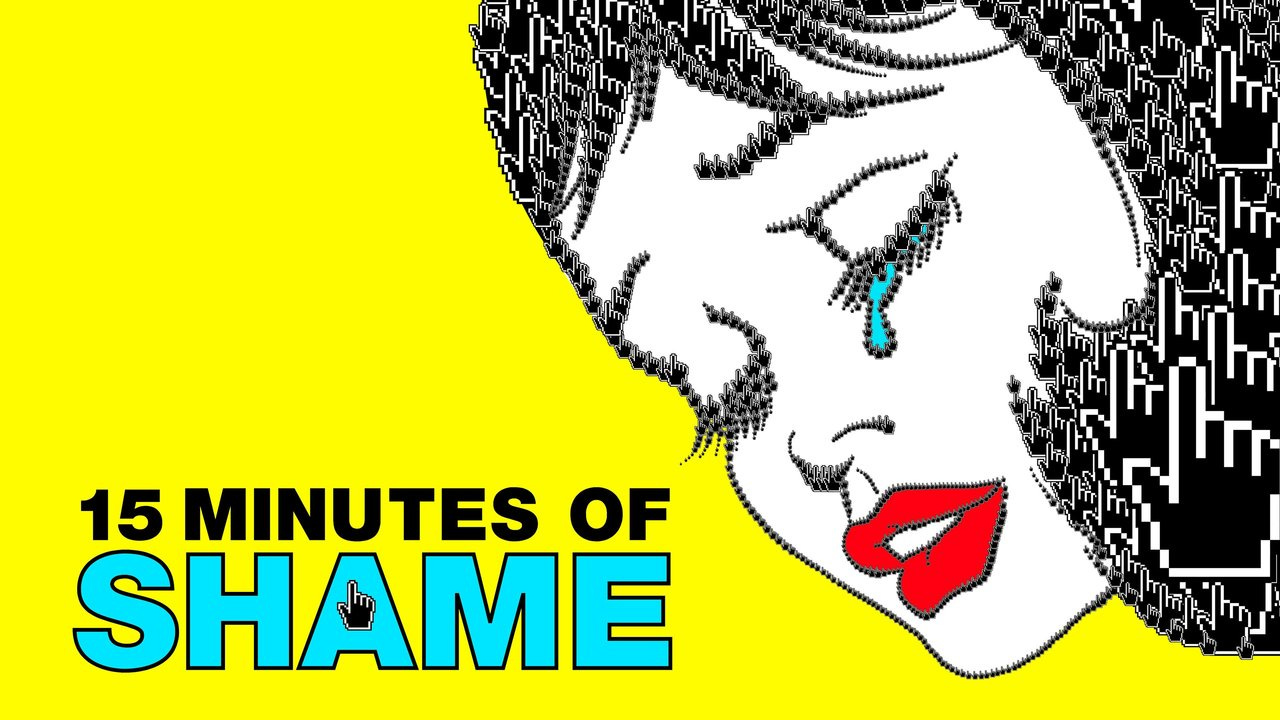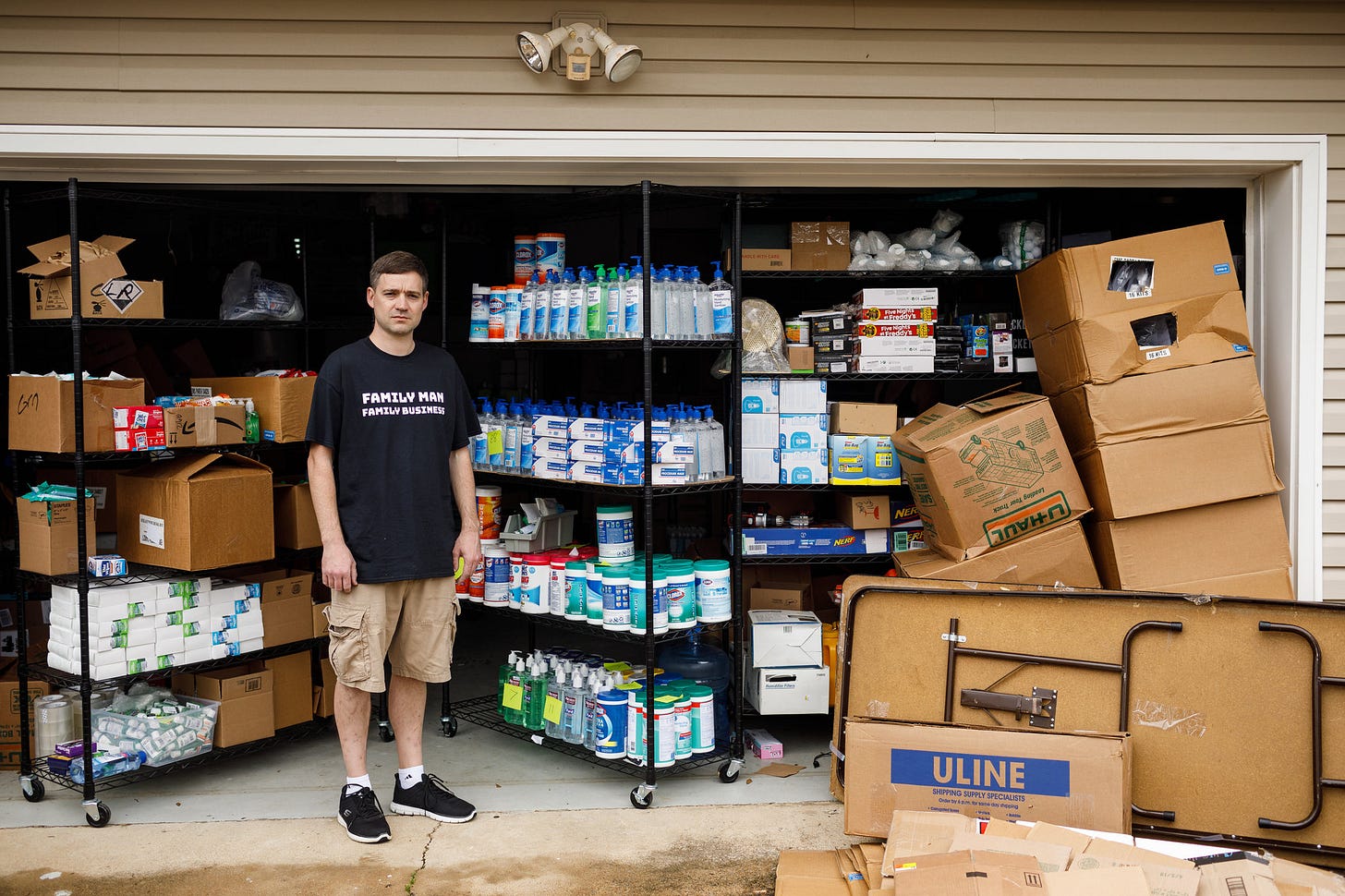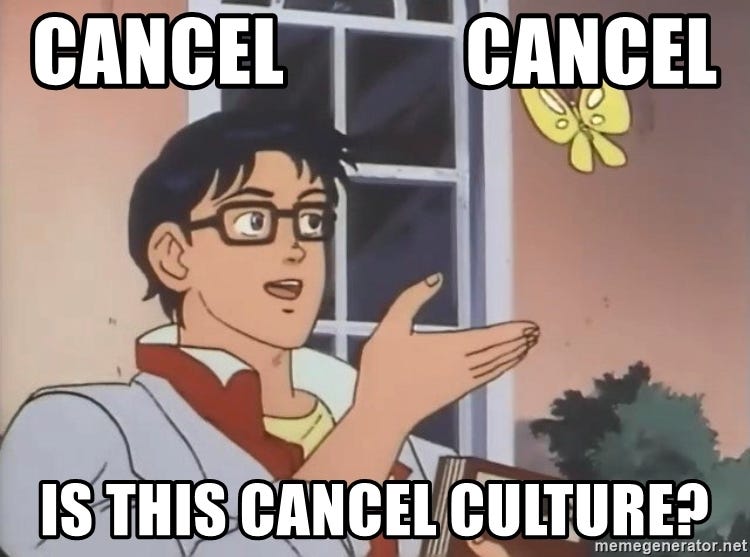**hello everyone, it’s been a minute, i know. the past month has intense for a plethora of reasons i won’t get into here. but this newsletter is turning 1! in that spirit, i’m doing away with my “volume” titles. this has been an experiment all along, and thanks for sticking around while i learn what works. here’s to another year of visiting your email inbox.**
I’ve tried writing a version of this newsletter a few different ways, all of which didn’t feel right.
Because, let’s be clear: I could be cancelled one day.
Please, don’t scroll away: I can explain. I’m not actually scared to be cancelled one day—let’s face it, I don’t see myself ever being important enough for anyone to care about my inevitable faux pas—but I do feel an inordinate level of cringe at the idea of all my old, embarrassing iterations of myself being dragged into the light of day.
Sure, I’ve said or done things that were problematic, or ignorant, or stupid in the past. But the fact of the matter is, I’m actually ok with that. I know I’ve grown as a person, and that I’m less ignorant now than, say, in 2011. It’s natural. We’ve all got some sort of skeleton in our closet, a belief we held or misunderstanding of a person, a group, an identity that has been corrected.
What I’m actually scared of is less the idea of being cancelled, but more the inability for others to see how I’ve held myself accountable for my mistakes.
The anxiety surrounding “cancellation” is a palpable one. I’ve noticed in my own professional life a real divide in the way folks talk about the mysterious invisible beast that is “cancel culture”. There are those who are genuinely anxious about doing right by difficult and sensitive subject matter, who are mindful about accessibility, histories of marginalization and oppression, and systemic inequalities. They still may do or say something ignorant, but they are willing to hold themselves to account when they do, to learn what they did wrong, and try to do right in the future.
But, more frequently, there’s a contingent of people who fear cancellation, but are unwilling to change. They resist efforts to learn about issues of systemic oppression, or present relatively small instances of past discrimination akin to, say, centuries of inherited racial trauma (I’m looking at you, fellow folks of Irish descent—our ancestors’ plight was and is nowhere near what people of color face). Everything new is seen as an affront or something to defend themselves against—how was I supposed to know?—as opposed to a learning opportunity. Rather than accountability, the initial, instinctual fear causes them to defend themselves. The plea of ignorance is meant to deflect from consequences.
This is, of course, not a perfect binary. It is merely an observation of a spectrum of attitudes. But perhaps these are merely two ways of anxiety manifesting, specifically the anxiety of being publicly shamed.
Cue “15 Minutes of Shame,” a new documentary from HBOMax, co-executive produced by Monica Lewinsky and MTV’s Catfish host Max Joseph. Focused on online bullying and shaming, Lewinsky and Joseph speak with various victims of “cancel culture,” mostly folks who have been wrongly accused or ganged up upon by internet “mobs.”
They visit and speak to these people in the aftermath of their lives falling apart, highlighting all of the ways in which their lives have been ruined financially, materially, and even physically (many have had death threats made against them and their families).
In other words: this documentary is supposed to be a real-life horror movie.
Perhaps the most notable of their interview subjects is Matt Colvin. He looks like a familiar suburban dad type guy, until I realized what I knew him from: the vicious memes back in March and April 2020. It’s then that I realized: he’s “hand sanitizer hoarder guy” from the early pandemic days.
Colvin has been so traumatized by the experience of his story being published in the New York Times, as well as the subsequent online backlash, that he can barely get through the interview without shaking and having visceral reactions to the then-recent incident.
Lewinsky and Joseph hit the viewer over the head with information about how his livelihood was destroyed, leaving his family in dire financial straits. Colvin claims that the NYT took his story out of context, and that he may never be able to recover (the NYT, however, denies this).
I don’t want to diminish Colvin’s pain. In fact, the physical reactions he has to talking about what happened are heart-wrenching, especially given just how recent the incident was. The experience clearly scarred him, and his nervousness to talk to a documentary film crew is evident throughout.
But it’s a bit tough to swallow that all victims of cancellation are as innocent and unimpeachable (no pun intended, Monica) as Colvin appears to be.
What I was most curious about were folks who were not wrongfully cancelled, but perhaps cancelled for perfectly good reasons—for repeated instances of ignorance or violence. Did the experience change them? How have they tried to make amends?
My biggest problem with the documentary is that it paints all cancelled people as unfairly bullied and shamed. And don’t get me wrong: plenty of folks are. But plenty of folks have also been cancelled for real reasons, typically repeat, violent, and/or offensive behavior. And many of them have not only resurrected their careers, but in the very recent case of Dave Chapelle, given them an opportunity to relish being “controversial,” propelling their public image to new heights.
It is worth remembering that cancellation itself was borne out of call-out and call-in culture in Black communities—a process in which accountability and education is paramount. This was born of necessity: if the local police and government couldn’t be trusted to deliver justice, it was up to the community to work with those who transgressed and educate them about what they did wrong. The guilty party had a chance to apologize, take stock of what they did and why it was wrong, all while still showing them respect.
But “cancel culture” is now a dirty phrase beloved by Tucker Carlson and other conservatives who fear inclusivity and accessibility. It is a moral panic not unlike the Satanic Panic of the 90s, only this time the danger is not satanic cults and infant sacrifice we’re told to fear, but the cult of online “PC” police, jonesing to bring down innocent people and consume innocent white men for having the audacity to not be perfect.
Tucker Carlson and all the robot-like Fox figures know full and well that that’s not actually what’s happening. But it’s easier to deflect responsibility than admit to wrongdoing, risk appearing weak, and actually have to sit with shame and discomfort.
*
Not long ago, I taught at a program that had decided, for the first time, to give an overarching content warning to students about some of the difficult material they’d encounter. This had been a student suggestion—many students wanted the institution to acknowledge historic texts that reflected old, outdated, and even dangerous ideas about race, gender, sex, sexuality, class, and beyond.
I liked the content statement. It felt fair, but didn’t necessarily encourage students to shy away from difficult texts. I saw no problem with it—the idea of holding me as a teacher, as well as the program, accountable for material that is difficult to sit with today felt refreshingly honest.
But many teachers, particularly those who had been around a long time, were initially dismayed. Why assume that students couldn’t handle these texts? Shouldn’t learning be uncomfortable sometimes? Won’t this scare the students? Why are we anticipating that they will object to the material at hand?
What resulted was a conversation I’d characterize as, well, uncomfortable. But it was clear that the conversation for those who took issue with the statement were the ones afraid, not the students themselves. This was holding them to account in ways perhaps they hadn’t exercised before, or that they weren’t sure they could handle. It was simultaneously understandable and infuriating.
Yet when I gave the content warning to my students, they appreciated it. When I asked for feedback on it—perhaps we could treat this like a working document that we could add on to—students had nothing to say about it. At most, they wanted to rearrange some of the sentences on the page to flow better.
In other words: what the statement said didn’t phase the students. The accountability that the document promised, as well as the conversation I could have with them as a result about what I owed them as a teacher, and what they owed to one another (as well as themselves) when things got difficult was necessary. It opened up an excellent conversation, one I’ve been continuing to have since: what does accountability look like for wrongdoing, accidental or otherwise? And how can we make it less startling to embark upon for those who bristle against it?
I’m not saying these kinds of classroom conversations always goes well, or that I don’t make mistakes as a teacher, or that I will always get it right. But I do think far more of us can handle, and should strive for, public accountability. We’re not all innocent and perfect, and we shouldn’t want to be either. The anxiety of wanting to do right is real, but painting all repeat offenders as innocent and anxious and therefore worthy of our sympathy won’t change anything.
Accountability requires learning from your mistakes. And fear of “cancel culture” isn’t conducive to learning, only defensive posturing.
*
Author and public shaming expert Jon Ronson once wrote, “The snowflake never has to feel responsible for the avalanche.” If we gang up on someone online, berate them over Twitter or comment with a snake emoji under their Instagram, we can feel vindicated without ever bearing responsibility for the resulting pain caused.
But the shamed individual, if they did do something shameful, has a responsibility to the avalanche of response (and, likely, hurt) they have caused. After all, chances are someone who has touched a collective nerve hasn’t merely done nothing. There is clearly something to learn from the experience, particularly where ignorance has perhaps snow-blinded them to the reality they wish to ignore.











